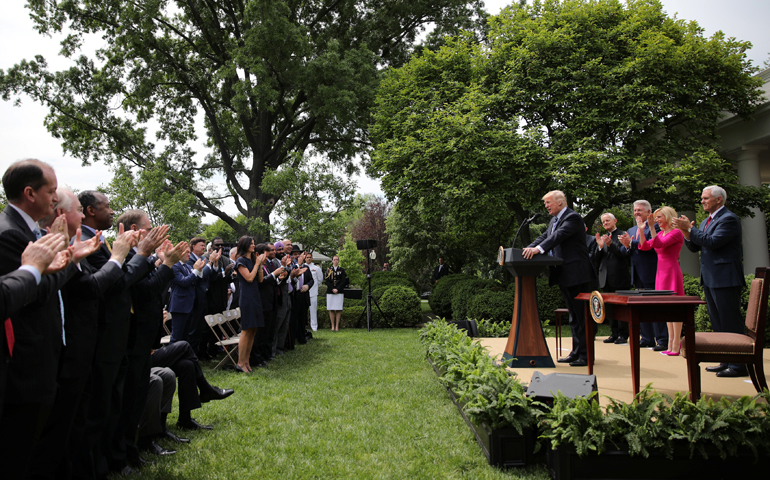
President Donald Trump speaks May 4 during a National Day of Prayer event at the White House in Washington. (CNS/Carlos Barria, Reuters)
If you Google “chaos theory,” the first thing to come up is this definition: “Chaos theory is a branch of mathematics focused on the behavior of dynamical systems that are highly sensitive to initial conditions.” In the case of the United States today, the initial condition that matters most is that we have an enfant terrible as our president. And the dynamical system which is our government is greatly affected.
Less than a week after President Donald Trump fired FBI Director James Comey, the Washington Post reported that during a meeting with Sergei Lavrov, Russian foreign minister, the president revealed highly sensitive intelligence information that had not even been shared with our allies.
H.R. McMaster, national security advisor, took what is now a walk of shame, from the West Wing to the North Lawn and a bank of waiting television cameras, to explain that the president had not discussed particular methods or sources with the Russians. OK. But, that is not what the Washington Post reported. They reported he had disclosed information drawn from sensitive sources. Say you are traveling abroad, and someone from home calls to tell you about something back home or at the workplace: You can figure out a lot about how that person came to that information from merely knowing that the person had it.
Then, to add insult to injury, after his aides spent the night saying the president had not shared anything particularly sensitive with the visiting Russians, Trump erupted in one of his early morning tweet storms: “As President I wanted to share with Russia (at an openly scheduled W.H. meeting) which I have an absolute right to do, facts pertaining …. to terrorism and airline flight safety. Humanitarian reasons, plus I want Russia to greatly step up their fight against ISIS and terrorism.” So, he admitted what his aides spent half a day denying, and then wonders why he has a credibility problem?
The particulars of this latest breach of standards would be alarming in any circumstance. But, this breach is just one of many in the little more than one hundred days the president has been in office. Sen. Susan Collins, R-Maine, hit the nail on the head when she said to a reporter: “Can we have a crisis-free day? That’s all I’m asking.” One suspects that if this continues, even Republicans will be pining for the return of “No Drama Obama.”
After the firing of Comey, a friend of the president’s was interviewed. “This was the first major crisis or test they’ve had, and it looks like a lot of systems failed,” Chris Ruddy, a Trump confidant and chief executive of Newsmax, told the Washington Post. Ruddy is wrong. The systems did not fail. The systems were susceptible to an initial condition, in this case an impetuous president who listens to his gut instead of consulting history, the law or his own advisors.
President Trump campaigned on the fact that he would be disruptive in Washington. There is something healthy and democratic about the desire to “throw the bums out” or, as he put it during his campaign, to “clean the swamp.” Power does become entrenched, and not only power, but ideas and ideologies, habits of mind and of method, all of which need to be overturned at times because they no longer serve their original functions. But, if you flip the omelet without preparation and care, it breaks apart and you are left with a mess. Usually in a democracy, overturning happens slowly, and with forethought, mindful of the fact that even if a set way of doing things has outlived its purpose, that purpose likely remains important. Simply disrupting with no thought of what must be built subsequently leads to chaos. That is where we find ourselves as a nation.
In his speech to the World Meeting of Popular Movements in Modesto, California, earlier this year, Bishop Robert McElroy mentioned the president’s campaigning as a disruptor and then said this:
Well now, we must all become disruptors. We must disrupt those who would seek to send troops into our streets to deport the undocumented, to rip mothers and fathers from their families. We must disrupt those who portray refugees as enemies rather than our brothers and sisters in terrible need. We must disrupt those who train us to see Muslim men, women and children as forces of fear rather than as children of God. We must disrupt those who seek to rob our medical care, especially from the poor. We must disrupt those who would take even food stamps and nutrition assistance from the mouths of children.
But we, as people of faith, as disciples of Jesus Christ, as children of Abraham, as followers of the Prophet Muhammad, as people of all faiths and no faith, we cannot merely be disruptors, we also have to be rebuilders.
The bishop went on to list the ways we, as Catholics, must help to rebuild a society based on solidarity and respect for the human dignity of each and every person.
Rebuilders. That is what all who have joined the “resistance” to President Trump must consider. It is what those Republicans in Congress, weighing how much of this chaos they can take or, more importantly, how much the nation can take, must consider. How do we rebuild our country from both the mess Trump is creating and from the conditions that made his presidency possible?
Tomorrow, I shall look at the president’s first foreign trip, which begins this week, and how this chaos is precisely what the world does not need but how, nonetheless, it an option, a bad option, to a choice that still needs to be faced: What comes after neoliberalism?




